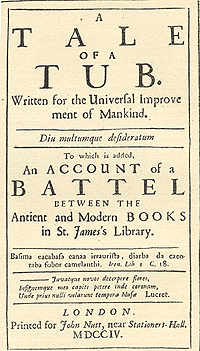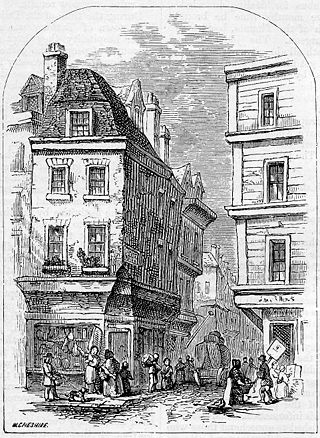Related Research Articles

Jonathan Swift was an Anglo-Irish satirist, author, essayist, political pamphleteer, poet, and Anglican cleric who became Dean of St Patrick's Cathedral, Dublin, hence his common sobriquet, "Dean Swift".

Gulliver's Travels, or Travels into Several Remote Nations of the World. In Four Parts. By Lemuel Gulliver, First a Surgeon, and then a Captain of Several Ships is a 1726 prose satire by the Anglo-Irish writer and clergyman Jonathan Swift, satirising both human nature and the "travellers' tales" literary subgenre. It is Swift's best known full-length work, and a classic of English literature. Swift claimed that he wrote Gulliver's Travels "to vex the world rather than divert it".

John Arbuthnot FRS, often known simply as Dr Arbuthnot, was a Scottish physician, satirist and polymath in London. He is best remembered for his contributions to mathematics, his membership in the Scriblerus Club, and for inventing the figure of John Bull.
This article contains information about the literary events and publications of 1726.

A Tale of a Tub was the first major work written by Jonathan Swift, composed between 1694 and 1697 and published in 1704. It is arguably his most difficult satire, yet considered by some to be his best. The Tale is a prose parody divided into sections of "digression" and a "tale" of three brothers, each representing one of the main branches of western Christianity. A satire on the Roman Catholic and Anglican churches and English Dissenters, it was famously attacked for its profanity and irreligion, starting with William Wotton, who wrote that it made a game of "God and Religion, Truth and Moral Honesty, Learning and Industry" to show "at the bottom [the author's] contemptible Opinion of every Thing which is called Christianity." The work continued to be regarded as an attack on religion well into the nineteenth century. One commentator complained that Swift must be "a compulsive cruiser of Dunghils … Ditches, and Common-Shores with a great Affectation [sic] for every thing that is nasty. When he spies any Objects that another Person would avoid looking on, that he Embraces.”
Edmund Curll was an English bookseller and publisher. His name has become synonymous, through the attacks on him by Alexander Pope, with unscrupulous publication and publicity. Curll rose from poverty to wealth through his publishing, and he did this by approaching book printing in a mercenary and unscrupulous manner. By cashing in on scandals, publishing pornography, offering up patent medicine, using all publicity as good publicity, he managed a small empire of printing houses. He would publish high and low quality writing alike, so long as it sold. He was born in the West Country, and his late and incomplete recollections say that his father was a tradesman. He was an apprentice to a London bookseller in 1698 when he began his career.

Jacob Tonson, sometimes referred to as Jacob Tonson the Elder (1655–1736), was an eighteenth-century English bookseller and publisher.

Until the early 19th century, Grub Street was a street close to London's impoverished Moorfields district that ran from Fore Street east of St Giles-without-Cripplegate north to Chiswell Street. It was pierced along its length with narrow entrances to alleys and courts, many of which retained the names of early signboards. Its bohemian society was set amidst the impoverished neighbourhood's low-rent dosshouses, brothels and coffeehouses.

Drapier's Letters is the collective name for a series of seven pamphlets written between 1724 and 1725 by the Dean of St Patrick's Cathedral in Dublin, Jonathan Swift, to arouse public opinion in Ireland against the imposition of a privately minted copper coinage that Swift believed to be of inferior quality. William Wood was granted letters patent to mint the coin, and Swift saw the licensing of the patent as corrupt. In response, Swift represented Ireland as constitutionally and financially independent of Britain in the Drapier's Letters. Since the subject was politically sensitive, Swift wrote under the pseudonym M. B., Drapier, to hide from retaliation.
Lindalino is a fictional city from the 1726 satirical novel Gulliver's Travels by Jonathan Swift. Lindalino successfully revolted against the flying island of Laputa. The name Lindalino is a play on words of Dublin.
The Merryland books were a genre of English 17th and 18th century erotic fiction in which the female body was described in terms of a topographical metaphor derived from a pun on Maryland. Four of the titles were published by 18th century controversialist Edmund Curll.
Nationality words link to articles with information on the nation's poetry or literature.
Events from the year 1724 in Ireland
Jonathan Swift, as Dean of St. Patrick's Cathedral in Dublin, produced many sermons during his tenure from 1713 to 1745. Although Swift is better known today for his secular writings such as Gulliver's Travels, A Tale of a Tub or the Drapier's Letters, Swift was known in Dublin for his sermons that were delivered every fifth Sunday. Of these sermons, Swift wrote down 35, of which 12 have been preserved. In his sermons Swift attempted to impart traditional Church of Ireland values to his listeners in a plain manner.

George Faulkner was one of the most important Irish publishers and booksellers. He forged a publishing relationship with Jonathan Swift and parlayed that fame into an extensive trade. He was also deeply involved with the argument over copyright infringement and piracy, both creating and fighting "Irish editions".
Benjamin Motte was a London publisher and son of Benjamin Motte, Sr. Motte published many works and is well known for his publishing of Jonathan Swift's Gulliver's Travels.
William Whitshed (1679–1727) was an Irish politician and judge who held office as Solicitor-General and Lord Chief Justice of Ireland; just before his death he became Chief Justice of the Irish Common Pleas. He became the Member of Parliament for County Wicklow in 1703, and was appointed as Solicitor-General in 1709; he was Lord Chief Justice 1714–1727.

George Grierson was a Scottish-born printer and publisher in Dublin, Ireland, whose descendants continued in the book trade in Dublin for several generations. He was married to the editor and poet Constantia Grierson.
Sarah Hyde was an Irish printer and bookseller.
Sarah Harding was an Irish printer and publisher who suffered "inopportune imprisonments" for some of her publications. She is known for publishing Jonathan Swift's A modest proposal in 1729.
References
- Cornu, Donald. "Swift, Motte, and the Copyright Struggle: Two Unnoticed Documents". Modern Language Notes 54 (1939): 114–124.
- Davis, Herbert. "Introduction" The Drapier's Letters. Oxford: Clarendon, 1935.
- Ehrenpreis, Irvin (1958). Jonathan Swift: Volume III . Harvard University Press, 1983.
- Ferguson, Oliver W. Jonathan Swift and Ireland. University of Illinois Press, 1962.
- Lock, F. P. "The Text of 'Gulliver's Travels'" The Modern Language Review, Vol. 76, No. 3 (Jul., 1981): 513–533
- Lock, F. P. The Politics of "Gulliver's Travels". Oxford, 1980.
- Pollard, Mary. A Dictionary of Members of the Dublin Book Trade, 1550–1800. London: Bibliographical Society, 2000.
- Probyn, Clive. "Swift, Jonathan (1667–1745)", Oxford Dictionary of National Biography. Oxford: Oxford University Press 2004.
- Rose, Mark. "The Author in Court: Pope v. Curll (1741)" Cultural Critique, No. 21 (Spring, 1992): 197–217
- Swift, Jonathan. The Correspondence of Jonathan Swift. ed. F. Elrington Ball. London, 1910–1914.
- Swift, Jonathan. The Correspondence of Jonathan Swift 5 vols. ed. Harold Williams. Oxford, 1963–1965.
- Teerink, Herman. A Bibliography of the Writings of Jonathan Swift. Philadelphia: University of Pennsylvania Press, 1963.
- Ward, Robert E. Prince of Dublin Publishers. University of Pennsylvania, 1962.
- Williams, Harold. The Text of "Gulliver's Travels". Cambridge: Cambridge University Press, 1952.
- Woolley, James, "Arbuckle's 'Panegyric' and Swift's Scrub Libel: The Documentary Evidence," in Contemporary Studies of Swift's Poetry. ed John Irwin Fischer et al., 191–209. Newark: University of Delaware Press, 1981.